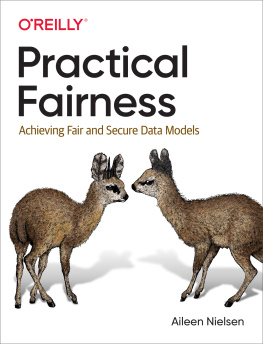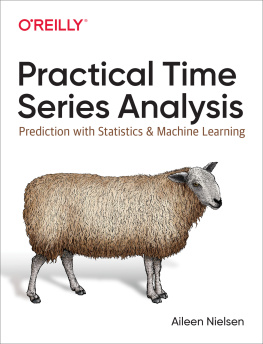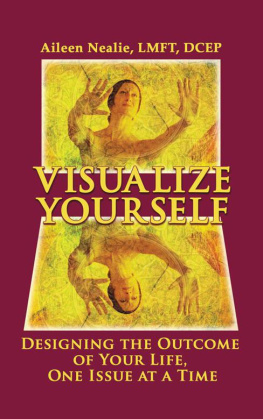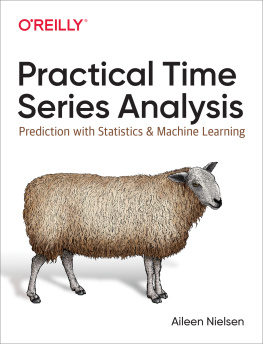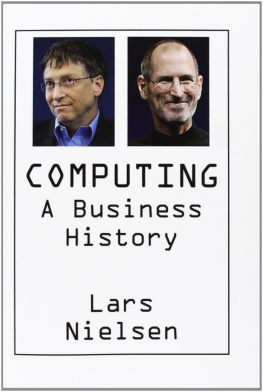Aileen Nielsen - Practical Fairness
Here you can read online Aileen Nielsen - Practical Fairness full text of the book (entire story) in english for free. Download pdf and epub, get meaning, cover and reviews about this ebook. year: 2020, publisher: OReilly Media, Inc., genre: Politics. Description of the work, (preface) as well as reviews are available. Best literature library LitArk.com created for fans of good reading and offers a wide selection of genres:
Romance novel
Science fiction
Adventure
Detective
Science
History
Home and family
Prose
Art
Politics
Computer
Non-fiction
Religion
Business
Children
Humor
Choose a favorite category and find really read worthwhile books. Enjoy immersion in the world of imagination, feel the emotions of the characters or learn something new for yourself, make an fascinating discovery.
- Book:Practical Fairness
- Author:
- Publisher:OReilly Media, Inc.
- Genre:
- Year:2020
- Rating:4 / 5
- Favourites:Add to favourites
- Your mark:
- 80
- 1
- 2
- 3
- 4
- 5
Practical Fairness: summary, description and annotation
We offer to read an annotation, description, summary or preface (depends on what the author of the book "Practical Fairness" wrote himself). If you haven't found the necessary information about the book — write in the comments, we will try to find it.
Practical Fairness — read online for free the complete book (whole text) full work
Below is the text of the book, divided by pages. System saving the place of the last page read, allows you to conveniently read the book "Practical Fairness" online for free, without having to search again every time where you left off. Put a bookmark, and you can go to the page where you finished reading at any time.
Font size:
Interval:
Bookmark:

by Aileen Nielsen
Copyright 2021 Aileen Nielsen. All rights reserved.
Printed in the United States of America.
Published by OReilly Media, Inc. , 1005 Gravenstein Highway North, Sebastopol, CA 95472.
OReilly books may be purchased for educational, business, or sales promotional use. Online editions are also available for most titles (http://oreilly.com). For more information, contact our corporate/institutional sales department: 800-998-9938 or corporate@oreilly.com .
- Acquisitions Editor: Jonathan Hassell
- Development Editor: Corbin Collins
- Production Editor: Katherine Tozer
- Copyeditor: JM Olejarz
- Proofreader: Sharon Wilkey
- Indexer: WordCo Indexing Services, Inc.
- Interior Designer: David Futato
- Cover Designer: Karen Montgomery
- Illustrator: Kate Dullea
- December 2020: First Edition
- 2020-12-01: First Release
See http://oreilly.com/catalog/errata.csp?isbn=9781492075738 for release details.
The OReilly logo is a registered trademark of OReilly Media, Inc. Practical Fairness, the cover image, and related trade dress are trademarks of OReilly Media, Inc.
The views expressed in this work are those of the author, and do not represent the publishers views. While the publisher and the author have used good faith efforts to ensure that the information and instructions contained in this work are accurate, the publisher and the author disclaim all responsibility for errors or omissions, including without limitation responsibility for damages resulting from the use of or reliance on this work. Use of the information and instructions contained in this work is at your own risk. If any code samples or other technology this work contains or describes is subject to open source licenses or the intellectual property rights of others, it is your responsibility to ensure that your use thereof complies with such licenses and/or rights.
978-1-492-07573-8
[LSI]
Welcome to Practical Fairness. I wrote this book because data scientists and machine learning engineers are increasingly aware of the fairness implications of their work but are not adequately empowered to do anything about their concerns. Academic research on mathematical solutions to fairness concerns is flourishing, and myriad open source options are available thanks to both academic researchers and technology companies sharing resources. However, delving into the topic in a practical and concrete way remains difficult for the beginner, and best practices have not yet emerged in most industries to address even the most basic concerns. This books aim is to be an accessible overview for beginners in this field with actionable fairness advice.
This book will help practicing data scientists and technologists get their feet wet in the world of fairness. The goal is that after reading this book, you can actively pursue fairness in your own work. Fairness doesnt have a one-size-fits-all solution, but you should be able to:
- Identify potential fairness problems in your organizations workflow and data practices
- Break fairness concerns into conceptually distinct categories and target appropriate areas of research literature accordingly
- Offer accessible guidance to nontechnical colleagues on potential fairness problems and solutions in whatever machine learning products you are developing
In this book I exclusively use Python examples and focus on the easiest interfaces available via open source options for implementing relevant fairness methods. I chose this approach because Python benefits from a large degree of open source work in the fairness domain. However, a good deal of work in other languages unfortunately had to be ignored, including in Java, R, and MATLAB code. Also, code bases with organizational sponsors and with a larger breadth of tools were favored over smaller code bases or code bases maintained by just a few individuals. This also meant that some very interesting and high-quality work was omitted. You should be aware that the goal of this book is far more to help you get conceptually organized and that the packages highlighted here are just one set of tools, not necessarily the best or only tools. The fairness toolbox continues to grow rapidly, and there is every reason to expect more tools and code bases to develop over time. The selections in this book represent just one snapshot of convenient APIs.
Fairness in machine learning and in the technology sector remains an active struggle, an ongoing social concern, and an interesting engineering problem. We need legal, economic, and social solutions as well as technical ones. Toward that end, 50% of the royalties earned on this book will be donated to the American Civil Liberties Union, an organization that has relentlessly pursued fairness for a hundred years. The ACLU is actively working to secure fundamental rights to privacy and fairness in the era of algorithms. Readers should be aware that the ACLU played no part in the writing of this book, has not reviewed it, and has not endorsed it. Nevertheless my hope is that this book will reinforce and support the ACLUs important work in more ways than one.
The other 50% of royalties earned on this book will be donated to Mercy for Animals, an organization dedicated to radically expanding our definitions of fairness to include the well-being of animals and Earth. Mercy for Animals takes a practical approach to addressing devastating cruelty and unfairness practiced in the fundamental industries that bring food to our table. Thus, my hope is that this books royalties can contribute to our societys ongoing development of a fairer and more inclusive outlook.
This book is partly about concepts and partly about coding. With respect to the coding, I found that some of the APIs I used were quite verbose. To cut down on the volume of code presented, I did not always include full running code examples in the text, but the full examples are available in the associated GitHub repository.
The topic of fairness is necessarily tinged with a political or ideological flavor, but I have tried to avoid politics and ideology. Also, I have written this book as a practical manual, not an academic treatise on the topic of fairness in machine learning. For this reason, many notions are taken for granted or defined at the level relevant for action rather than for philosophical discussion. So if I said anything controversial here, it was unintentional. For those interested in more academic or combative debates, you can find many places for that.
I want focus on the pragmatic task of increasing fairness in cases of obvious injustice, a simple and hopefully uncontroversial task. This book starts with a few premisesnamely, that we would all like a world where everyone has equal opportunities and receives fair treatment. We would all like a world where machines and digital interfaces do not undermine our autonomy or our privacy. We would all like a world where our increasing use of digital products and algorithmic decision-making tools results in better, more robust, and more secure outcomes rather than the opposite. This book provides key concepts to get you on your way to building the fairer digital products that will bring us closer to this desirable world.
The following typographical conventions are used in this book:
Font size:
Interval:
Bookmark:
Similar books «Practical Fairness»
Look at similar books to Practical Fairness. We have selected literature similar in name and meaning in the hope of providing readers with more options to find new, interesting, not yet read works.
Discussion, reviews of the book Practical Fairness and just readers' own opinions. Leave your comments, write what you think about the work, its meaning or the main characters. Specify what exactly you liked and what you didn't like, and why you think so.

